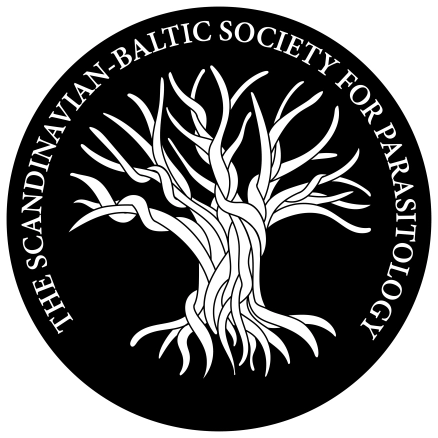Theme: Parasites and hosts in shared environment
(05.) 06.-07.06.2023 Tartu, Estonia
PRELIMINARY ON-SITE PROGRAM
Virtual participants can follow the main sessions online. Some parts, such as the workshops, are for on-site participation only.
Timezone: Eastern European Summer Time (GMT+3)
MONDAY, 05.06.2023
Updated venue 01.06.23: The Institute of Forestry and Engineering (Tehnikamaja), the Estonian University of Life Sciences,
Fr. R. Kreutzwaldi 56 Tartu 51006, Estonia
Google Maps: https://goo.gl/maps/GScieZC8xUXUrBjd9
| 14:00-16:00 | Workshop B* The basic principles of modelling host-parasite interactions Organizer: Dr. Dominique J. Bicout | Workshop C* Parasitology decoded: current and future potential of genomic technologies in parasitological research Organizers: Kristina Noreikiene, Alfonso Diaz-Suarez, Konrad Taube, Anti Vasemägi |
| 16:00-16:30 | Coffee break | |
| 16:30-18:00 | Early Career Researchers’ event Organizer: Dr. Azzurra Santoro, Italy Presenters: Dr. Azzurra Santoro, Dr. Elisabeth Dorbek-Kolin, Dr. Carolina Chagas and Dr. Vaidas Palinauskas |
Social programme get-together on June 5th
20:00-22:00 at NAIIV by the river Emajõgi (Vabaduse pst 5, Tartu)
TUESDAY, 06.06.2023
Venue: Conference Centre of University of Tartu Library (W. Struve 1, Tartu, Estonia)
Google Maps: https://goo.gl/maps/RQVVUZ9ZCPknTNfN6
NB: Virtual participants can access to the early-career researcher’s event, scientific program and e-posters.
| 9:00- 9:30 | Registration | |
| 9:30- 9:45 | Conference opening | |
| Session 1. | Moderator Epp Moks | |
| 9:45-10:30 | Dr. Pikka Jokelainen (Denmark) | Parasites from One Health point of view |
| 10:30- 10:50 | Poster pitches. Posters P.1.-P.18. | |
| 10:50-11:10 | Break/poster session | |
| Session 2. | Moderators Gunita Deksne and Elisabeth Dorbek-Kolin | |
| 11:10-11:55 | Prof. Urmas Saarma (Estonia) | Major parasitic zoonoses of the past: new insights with modern methods |
| 11:55-12:10 | Ants Tull | High overlap of zoonotic helminths between wild mammalian predators and rural dogs – an emerging One Health concern? |
| 12:10-12:25 | John Ellis | A state-of-the-art methodology for high-throughput in silico vaccine discovery against protozoan parasites and its application to Toxoplasma gondii |
| 12:25-12:40 | Ewa Bilska-Zając | Trich-tracker a new tool for epidemiological investigations in Trichinella outbreaks |
| 12:40-13:00 | Poster pitches. Posters P.20.-P.36. | |
| 13:00-14:00 | Lunch break | |
| Session 3. | Moderator Urmas Saarma | |
| 14:00-14:45 | Dr. Adriano Casulli (Italy) | Understanding transmission risk and unveiling the public health impact of CE and AE in Europe |
| 14:45-15:00 | Teivi Laurimäe | Exploring the genetic diversity of genotypes G8 and G10 of the Echinococcus canadensis cluster in Europe based on complete mitochondrial genomes |
| 15:00-15:15 | Tetiana Kuzmina | Horse strongylid community structure in the “ivermectin era” |
| 15:15-15:30 | Georg von Samson-Himmelstjerna | A long-term evolutionary ivermectin drug resistance study in the parasite model Caenorhabditis elegans |
| 14:30-15:45 | Mindaugas Šarkūnas | Comparative efficacy of injectable and oral moxidectin in treatment of cyathostomin infection in horses |
| 15:45-16:00 | Break/poster session | |
| 16:00-18:00 | Mindaugas Šarkunas; Ants Tull; Teivi Laurimäe; Liina Kinkar | Workshop A* A discussion panel on interdisciplinary challenges in the field of parasitology |
18:30 – 23:30 Social programme on June 6th
WEDNESDAY, 07.06.2023
Venue: Conference Centre of University of Tartu Library(W. Struve 1, Tartu, Estonia)
Google Maps: https://goo.gl/maps/RQVVUZ9ZCPknTNfN6
| Session 4. | Moderator Kristina Noreikiene | |
| 9:45- 10:30 | Prof. Tomáš Scholz (Czech Republic) | Gaps in parasitological research in the molecular & omics era |
| 10:30- 10:45 | Alfonso Diaz-Suarez | Metabarcoding reveals spatial and temporal variation of fish eye fluke communities in lake ecosystems |
| 10:45-11:05 | Break/ poster session | |
| Session 5. | Moderator Lea Tummeleht | |
| 11:05-11:50 | Dr. Lena Hulden (Finland) | The Northern range of malaria |
| 11:50-12:05 | Mélanie Duc | Haemoproteus majoris exo-erythrocytic stages across its different lineages and avian hosts |
| 12:05-12:20 | Anna Faltýnková | A unique species spectrum of larval trematodes (Trematoda, Digenea) in Bithynia tentaculata (Gastropoda, Littorinimorpha) in Europe |
| 12:20- 12:35 | Kristina Noreikiene | Transcriptomic responses of perch to diplostomid cercariae exposure |
| 12:35-12:50 | Ivanna Dmytriieva | Helminth species co-occurrence in marsh frog Pelophylax ridibundus (Amphibia: Ranidae) in Ukraine |
| 12:50-13:05 | Katarzyna Tołkacz | From mummy, with love: vertical transmission of Candidatus Neoehrlichia mikurensis and Hepatozoon sp. in voles (Microtus spp.) |
| 13:05-14:00 | Lunch break | |
| Session 6. | Moderators Teivi Laurimäe and Ants Tull | |
| 14:00-14:15 | Pernille Klein-Ipsen, Rosalina Rotovnik | Occurrence of Endoparasites in Greenland Sled Dogs (Canis lupus familiaris borealis) of East Greenland (Daneborg and Ittoqqortoormiit) |
| 14:15-14:30 | Guðný Rut Pálsdóttir | Strongyloides stercoralis: 10 years of colonisation attempts through imported dogs in Iceland (2012-2022) |
| 14:30-14:45 | Carina Schneider | The forgotten natives: Species identification and the assessment of genetic diversity of Mesocestoides spp. from wild and domesticated carnivores in Europe |
| 14:45-15:00 | Valentina Oborina | Anticipating Angiostrongylus vasorum emergence in dogs in Estonia: add to list of differential diagnoses |
| 15:00-15:15 | Neringa Kitrytė | Diversity and host specificity of ectoparasites of small mammals in Lithuania |
| 15:15-15:30 | Laima Baltrūnaitė | Seasonal dynamics and factors shaping ectoparasite communities of small mammals in Lithuania |
| 15:30-15:45 | Closure of the conference | |
| 15:45-16:00 | Break | |
| 16:00-16:45 | SBSP General Assembly** |
Here you can download the abstract book of the CSBSP10
WORKSHOP A
A discussion panel on interdisciplinary challenges in the field of parasitology
Time: on the 6th of June from 16:00 to 18:00 at the Conference Centre of the University of Tartu Library
Content of the workshop:
1. Introduction to the topic.
2. Group work: Identifying the everyday challenges and shortcomings within the field of parasitology in the region (apart from funding).
3. Potential solutions to each of the problems raised.
Organizers: Prof. Mindaugas Šarkunas, PhD (Lithuania); Ants Tull, PhD (Estonia); Teivi Laurimäe, PhD (Estonia); Liina Kinkar, PhD (Estonia)
